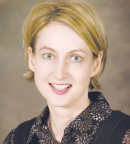
Laurie H. Sehn, MD
LAURIE H. SEHN, MD, Chair, Lymphoma Tumour Group, BC Cancer Agency, Vancouver, British Columbia, Canada, said these results are not unexpected and support de-escalation in selected patients.
“The FLYER trial evaluates treatment with four cycles compared with six cycles of cyclophosphamide, doxorubicin, vincristine, prednisone (CHOP), in combination with six cycles of rituximab (Rituxan) in young patients with favorable-prognosis diffuse large B-cell lymphoma (DLBCL). In essence, this trial included young patients, with nonbulky, limited-stage disease and no adverse clinical risk factors. Historically, standard treatment for these patients has been three cycles of R-CHOP and involved-field radiation, although more recently six cycles of R-CHOP has been commonly used,” Dr. Sehn explained.
“This trial accrued patients over an 11-year period (2005–2016), likely indicating the relative rarity of these patients. Nonetheless, 592 patients were enrolled. The trial results demonstrate that in this good-risk population, the administration of four cycles of CHOP was not inferior to six cycles of CHOP, when administered with six cycles of rituximab. Outcomes were excellent in both arms, with 3-year event-free survival of 89%, 3-year progression-free survival of between 94% and 96%, and 3-year overall survival of between 98% and 99%,” Dr. Sehn continued.
Sparing Many Patients Unnecessary Toxicity
“RESULTS FROM this trial are not surprising, as at least two previous trials have also demonstrated the efficacy of just four cycles of systemic therapy in favorable-risk patients. However, this trial is relevant and further supports the use of an abbreviated course of R-CHOP, without the need for radiation therapy, in these well-selected patients. This will undoubtedly save many patients unnecessary toxicity,” she said.
Dr. Sehn is interested in learning more about late relapses in this trial. “Interestingly, the authors noted that 33% of relapses occurred within the first 2 years, and delayed relapses are ongoing. Additional details on these patients who failed to respond to treatment will be of interest to better understand which ones may be less suited for this approach,” she noted. ■
DISCLOSURE: Dr. Sehn is a consultant for and has received honoraria from Merck, TG Therapeutics, Seattle Genetics, AbbVie, Lundbeck, Celgene, Amgen, MorphoSys, Karyopharm, Roche/Genentech, and Janssen.

